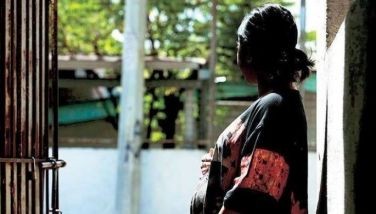Terrorism, Iraq war top APEC summit agenda
October 21, 2002 | 12:00am
MEXICO CITY (AFP) – Asia Pacific leaders will wrestle with the implications of the US war on global terror and Washington’s threat to fight a go-it-alone war with Iraq as they head to a tightly guarded annual summit next week in Mexico.
The Asia-Pacific Economic Cooperation (APEC) forum retreat, which opens on Wednesday in Los Cabos will, like most of its predecessors, see its pro-free trade mandate overshadowed by global political crises.
It will also take place under a net of intense security, as the luxury Pacific coast resort is turned into a fortress – especially before the weekend summit of 21 leaders, including presidents George W. Bush, China’s Jiang Zemin, and Russia’s Vladimir Putin.
The Bali bombing last week, which killed more than 180 people, again rammed home that few nations are immune from international terrorism, and cranked up pressure on members, especially, those from Asia, for concrete action.
US negotiators head to APEC hoping for progress in expanding anti-terror commitments made by member governments last year, a few weeks after the Sept. 11 terror attacks.
The top US APEC official Lawrence Greenwood said: "It will be very specific commitments with very specific deadlines."
"We are looking forward to a very ambitious and robust statement from the leaders on counterterrorism."
Indonesia’s President Megawati Sukarnoputri will face particular scrutiny after being accused of doing too little to combat radical Islamic groups before the Bali blast.
APEC is seen by US officials as a particularly appropriate forum to work to choke terrorist groups of their financing, and to put up barriers to terrorists through immigration and customs cooperation.
As war clouds gather over Iraq, Bush will confront unease among APEC leaders over his threat to target Saddam Hussein unless he cedes his weapons of mass destruction.
Should he have failed to win a UN Security Council consensus on a resolution on Iraq by the time the summit begins, Bush’s encounters with leaders of permanent five veto-wielding members Russia and China will generate extra interest.
And after the United States said that Stalinist North Korea had defied international agreements to pursue nuclear weapons, the spotlight will be on a three-way summit on the sidelines of APEC between Bush, Japanese Prime Minister Junichiro Koizumi and South Korean President Kim Dae-Jung.
But smaller APEC nations in Latin America and Asia, which have seen their regions ravaged by economic crises, may try to wrest the agenda away back to economics.
Such states, like Chile and Mexico, for instance see trade as their only hope out of an economic hole and means of raising capital, since regional markets have been deserted by crisis-wary investors.
On the trade front, the US will join an effort to speed up talks on the Doha trade liberalization agenda launched last November, Greenwood said.
Leaders will also look to follow up pledges made at the last APEC summit in Shanghai on expanding the digital economy, transparency and streamlining customs transactions.
APEC groups 21 Pacific Rim nations: Australia, Brunei, Canada, Chile, China, Hong Kong, Indonesia, Japan, Malaysia, Mexico, New Zealand, Papua New Guinea, Peru, the Philippines, Russia, Singapore, South Korea, Taiwan, Thailand, the United States and Vietnam.
The Asia-Pacific Economic Cooperation (APEC) forum retreat, which opens on Wednesday in Los Cabos will, like most of its predecessors, see its pro-free trade mandate overshadowed by global political crises.
It will also take place under a net of intense security, as the luxury Pacific coast resort is turned into a fortress – especially before the weekend summit of 21 leaders, including presidents George W. Bush, China’s Jiang Zemin, and Russia’s Vladimir Putin.
The Bali bombing last week, which killed more than 180 people, again rammed home that few nations are immune from international terrorism, and cranked up pressure on members, especially, those from Asia, for concrete action.
US negotiators head to APEC hoping for progress in expanding anti-terror commitments made by member governments last year, a few weeks after the Sept. 11 terror attacks.
The top US APEC official Lawrence Greenwood said: "It will be very specific commitments with very specific deadlines."
"We are looking forward to a very ambitious and robust statement from the leaders on counterterrorism."
Indonesia’s President Megawati Sukarnoputri will face particular scrutiny after being accused of doing too little to combat radical Islamic groups before the Bali blast.
APEC is seen by US officials as a particularly appropriate forum to work to choke terrorist groups of their financing, and to put up barriers to terrorists through immigration and customs cooperation.
As war clouds gather over Iraq, Bush will confront unease among APEC leaders over his threat to target Saddam Hussein unless he cedes his weapons of mass destruction.
Should he have failed to win a UN Security Council consensus on a resolution on Iraq by the time the summit begins, Bush’s encounters with leaders of permanent five veto-wielding members Russia and China will generate extra interest.
And after the United States said that Stalinist North Korea had defied international agreements to pursue nuclear weapons, the spotlight will be on a three-way summit on the sidelines of APEC between Bush, Japanese Prime Minister Junichiro Koizumi and South Korean President Kim Dae-Jung.
But smaller APEC nations in Latin America and Asia, which have seen their regions ravaged by economic crises, may try to wrest the agenda away back to economics.
Such states, like Chile and Mexico, for instance see trade as their only hope out of an economic hole and means of raising capital, since regional markets have been deserted by crisis-wary investors.
On the trade front, the US will join an effort to speed up talks on the Doha trade liberalization agenda launched last November, Greenwood said.
Leaders will also look to follow up pledges made at the last APEC summit in Shanghai on expanding the digital economy, transparency and streamlining customs transactions.
APEC groups 21 Pacific Rim nations: Australia, Brunei, Canada, Chile, China, Hong Kong, Indonesia, Japan, Malaysia, Mexico, New Zealand, Papua New Guinea, Peru, the Philippines, Russia, Singapore, South Korea, Taiwan, Thailand, the United States and Vietnam.
BrandSpace Articles
<
>
- Latest
- Trending
Trending
Latest
Trending
Latest
Recommended































